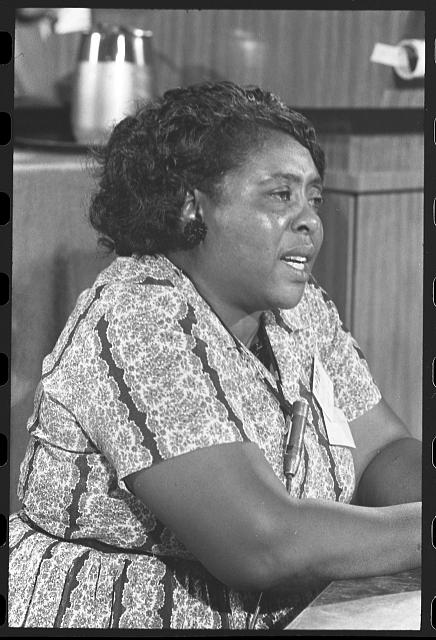
Celebrating Black Food Activism during Black History Month – Fannie Lou Hamer
Black History Month is to celebrate and remember all of the contributions Black people have made throughout history. At the Belfast Community Co-op, food and people are at the center of our mission. We recognize that we owe a lot to the Black scientists, innovators, and teachers who came before us – fighting to make food available to all. So this Black History Month, let us tell you about some people who were instrumental in strengthening our food systems.
Fannie Lou Hamer was born in 1917 as the 20th child of sharecroppers in the Mississippi Delta. From a young age, she worked alongside her family, picking cotton by the time she was six years old. In 1961, after a routine surgery, she was forcibly sterilized without her consent—an experience that was tragically common for Black women at the time, known as a “Mississippi Appendectomy.” This unjust act ignited Hamer’s passion for activism and set her on the path to becoming a powerful leader in the Mississippi Civil Rights Movement.
The following year, Fannie Lou Hamer was denied the right to vote due to discriminatory laws, but she refused to remain silent. Her determination to fight for her rights led her to attend a 1962 SNCC (Student Nonviolent Coordinating Committee) conference at Fisk University in Nashville. Upon returning home, Hamer remained steadfast in her work for desegregation and voter registration. She also became deeply involved in relief efforts, distributing food and clothing to the poorest residents of the Mississippi Delta. Having experienced poverty firsthand, she recognized that economic stability was crucial to the success of the Civil Rights Movement. In 1963, as part of a protest, Hamer and other activists sat at a whites-only lunch counter at a bus station. She was arrested and received beatings that impacted her health for the remainder of her life.
In 1969, Hamer founded the Freedom Farm Cooperative (FFC) to help farmworkers experiencing hunger in the Mississippi Delta with a donation from Measure for Measure, a charitable organization in Wisconsin. The farm grew to over 640 acres and served more than 1,600 families. Families could join the farm for $1 a month but most were unable to pay that amount. Cash crops like soybeans and cotton were grown to cover taxes and administrative expenses. The rest of the land was for growing vegetables and distributed back to those who worked on the co-op. This program also included a “pig bank.” With funds from the National Council of Negro Women, the co-op bought 35 gilts (female pigs) and 5 boars (male pigs). Over the next few years, the pig bank produced thousands of new pigs to feed impoverished families. Hamer’s program prioritized “allowing members to learn skills and become self-sufficient and economically stable” with the hope that this would eradicate hunger.
Fannie Lou Hamer’s legacy reminds us that food security and social justice are inseparable. By combining grassroots activism with agricultural innovation, she empowered countless families to take control of their futures. Her work through the Freedom Farm Cooperative not only alleviated hunger but also fostered a sense of community and self-reliance that rippled through the Mississippi Delta and beyond.
This Black History Month, as we reflect on the contributions of individuals like Fannie Lou Hamer, we are reminded of the power of collective action, the importance of fighting for equality, and the need to create sustainable food systems that serve all people. Let us honor their legacies by continuing to work toward a world where access to healthy, nourishing food is a right, not a privilege, and where the struggles of the past fuel our determination for a just future for all.
Sources
https://snccdigital.org/events/fannie-lou-hamer-founds-freedom-farm-cooperative/
https://www.womenshistory.org/education-resources/biographies/fannie-lou-hamer
Everyone is welcome to shop at the Co-op; it is our mission and our pleasure to bring locally-sourced, reasonably priced, organic and natural products to all.
Owned by you. Food for all.

